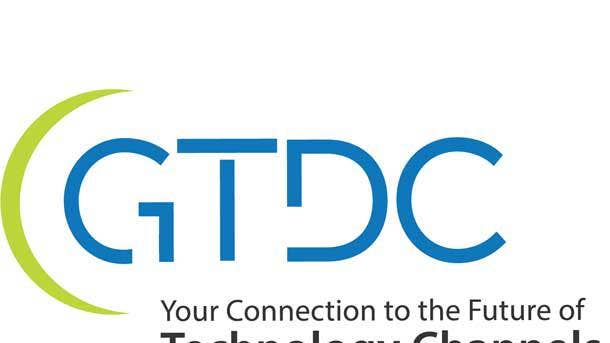GTDC CEO Frank Vitagliano On The Value Of Modern Distribution And The Opportunity Ahead
Frank Vitagliano -- former channel exec at IBM, Juniper Networks, and Dell EMC and former president of solution provider Computex -- is bringing his experience to the Global Technology Distribution Council to help shape the new future of distribution.

Distribution Is Changing, Time For GTDC To Change
As the IT industry continues its headlong race to the future with emerging technologies such as hybrid clouds and IoT, distributors need to show they're ready to tackle modern, emerging solution provider requirements. And that's just what Frank Vitagliano, a 30-year-plus channel veteran and the new head of the Global Technology Distribution Council, plans to do.
Vitagliano (pictured right with The Channel Company Chairman Robert Faletra), who took over the leadership role after the December retirement of former GTDC head Tim Curran, brings a wealth of channel experience to his work at the council, including over 30 years in senior channel roles at IBM, Juniper Networks, and Dell EMC, and two-plus years as president and CEO of Computex Technology Solutions, a Houston, Texas-based solution provider. He recently sat down with CRN to talk about how the role of distribution is changing and how he hopes to use GTDC to articulate how those changes will improve how distributors better work with solution providers to take advantage of emerging technologies.
GTDC later this week will hold its annual conference in San Francisco. But why wait to see how distribution is changing. Click through and get the preview.

Why did you decide to join the GTDC?
A couple reasons. One is, it really sucks retiring. I had retired. I had left Computex, and I decided to retire. And I took about a year off. And I just felt like I needed to stay engaged in the industry and do more and keep active, etc.
So the opportunity came up. I've been close to and known the distributors for years. On the vendor side, obviously, I partnered with them. But even more significant, I was a customer of theirs's for the last two years. And so I have a pretty good sense of the value distributors provide in the industry. And I've always felt it's been under-appreciated. So I thought, well, here's an opportunity to come back and take a job where I can maybe help that and then work arm-in-arm with the member companies that are part of our association, and hep articulate the value of distribution back into the marketplace.
So it wasn't just the wife kicking you out of the house?
It was partly that, too. That had a little to do with it, I have to be honest.

GTDC has an annual conference, but otherwise has traditionally seemed pretty silent. Do you have any ideas about how to bring the idea of distribution more front-and-center?
I do. There are a couple things. It has been around for quite some time. And initially, when GTDC got started, the goal of the GTDC was, and always will be, to promote the value of our member companies into the marketplace. Well, when you kinda say, "into the marketplace," what does that mean? What constituents does that mean? Initially, it was primarily the financial community back in the day 20 years ago when this first got started. And so for the first 10 years or so, Tim [Curran] and his team did an excellent job helping articulate the value to the financial analysts and so on. And at that time, that was needed.
However, over time, as companies went public--Ingram went public, Tech Data might have been a public company already, if not they did shortly, and Synnex during that period went public--it became less important for a trade association to do that because the companies are way better than we could be at doing that. And now, they're extraordinarily well-known companies all followed by financial analysts. So the need for GTDC to do that wasn't that relevant anymore.

Who is GTDC targeting now?
We really play to three constituents. The first and most important is the vendor community. Having spent a lot of years in the vendor community, I can tell you that, while vendors clearly use distribution to get product and services to market, they certainly don't always understand the value that distribution provides. In a lot of cases, that value just isn't understood. And that's not only with legacy vendors, but it's also with emerging technology companies...
The second part of that is being able to articulate the value distribution provides beyond pick, pack, ship, and credit, when most people assume that's it. Well, it's far more than that in a normal environment. But when you add to it the transition we're going through with digital transformation, it's even becoming more relevant and more critical. And there's a lot of folks that would tell you, ehhh, they shouldn't really be called distributors any more, they should be called solution aggregators. I don't know if that's right or wrong. But the theme is, they're doing way more than just delivering physical product. So that's the first constituency, and the most important.
What's the second constituency?
The second constituency is obviously the solution providers, [the distributors'] customers. I don't think I need to do a ton there other than just keep awareness in the marketplace of what [distributors are] doing. Because they do a very good job of that. Distributors do an excellent job of managing their customers, recruiting their customers, partnering with their customers. I can tell you that from personal experience, having been a customer of theirs' for a couple of years.
And then the third constituency is everybody else in the ecosystem. It could be industry analysts. It could be folks like you, the press, the media. … There are a lot of folks in the industry that are influencers, consultants, the big consultancies. They don't understand distributors. They don't understand really what they do. They don't understand the value they provide. And as a result, it comes through in a lot of the work that they do. So they're doing work for various companies, mostly vendors, and they're doing routes to market, analysis work for them, developing routes to market, recommending various things. And guess what? They don't understand a major part of how product gets to market in the industry. That's a problem.

What does GTDC need to do to reach those constituencies?
We need to kind of change our view to more forward-looking: Where is distribution going? What is distribution doing? What can they provide in the future? And I would tell you that, having done this a long time, I can't count the number of times that distribution was going to be disintermediated. And it hasn't happened yet. And it probably won't happen in my lifetime. And the reason for that is, [distributors] continue to morph themselves into adding new value on top of--and this is a really important piece for people to understand--on top of some core competencies that nobody else can do. People might want to sort of dismiss pick, pack, ship, and credit. Well guess what? Go try and do it. Go try to do pick, pack, ship, and credit. I can tell you, there's a number of vendor companies over the years that have tried, and will continue to probably try, and they can't do it, they can't do it well. And so distribution, fundamentally, has that layer. And then they add to it the things that they're doing with cloud marketplaces, IoT, and things like that, and it makes it more important or relevant.

What does that mean to GTDC?
Our role at GTDC is to promote the value, to articulate that, and we're going to do it in a number of different ways. One of the things that we'll do is, we traditionally have developed white papers and research that helped articulate that data. For example, we had built a white paper, maybe 10 years ago, that very specifically talked about the value that disties provide in financial terms. [It was] primarily targeted towards the vendor community. A vendor channel executive could take that document and sit down with the CFO of their company when the CFO was hammering him or her about why are we investing in distribution, and articulate, 'This is some of the value. Do you understand that, for example, when a distributor owns the relationship with the solution provider, there's no bad debt write-offs on the part of the vendor. That doesn't happen. You understand the value of pre-sales engineering support and post sales engineering support, people that we don't have to hire.' … As a vendor executive, I could take that into and sit with folks within the organization that weren't quite sure what distribution did and how they did it.
That seems so obvious now.
So we're going to refresh a lot of the content. There's a lot of training material targeted towards folks in the vendor community that may not need to be financially-oriented but more along the lines of fundamentals: What do disties do, and how can they do it, and why you should be looking at it. And one of the big reasons that needs to obviously refreshed is, we now have a full array of services associated with cloud marketplaces, what's happening in the digital transformation world. And they're still evolving, as you would expect. A lot of [IT] is not physical distribution any more. It's now virtual, and it's services-related. And we need to do a better job with that.
We also need to be more up-front, and I plan to be, at some [general industry] events. Obviously, when Ingram does an event, or Tech Data does an event, or Arrow does an event, they do a fabulous job at that. [I'm now really] talking about events like XChange, for example. Today, here at XChange, there's 320 solution providers. And every one of them is working with distribution. Maybe very different distributors. It would be a good idea to have a presence here. GTDC should have a presence, and I can promote the value. And [partners] can decide which distributor they want to go work with.
So there's a number of things I've got going.

As you look to the next year and beyond, what are the one or two biggest changes you see coming in terms of how they impact distribution and its relationship with channel partners?
A couple things. I think one will be continued consolidation in the marketplace [on the distribution side]. I don't think there's any question about that. I think there'll continue to be different opportunities.
But the second will be the figuring out, and being able to monetize, the emergence of all the digital transformation activities that are happening. When I say monetize, I mean that not just from the distribution standpoint but also from the solution providers' standpoint. There's a lot of things going on, and one of the advantages of having spent two years as a solution provider is that I got to kind of really see how hard it is to make investments and have those investments pay off in areas that aren't obvious. So, back in the day, a new product came out, a new category came out, not much changed. You go find a couple people, you train them, you get products shipped, you order it, you deliver it, same old thing. Now it's totally different. How do you charge somebody for IoT? What's the business model, right? What's the business model for artificial intelligence? Machine learning?
What's different?
What's happening is, and it's very much similar as it was with the cloud six or seven or eight years ago: Cloud. Cloud. Cloud. It's all people were talking about. Back at some convention, you and I probably talked about it, right? And it took forever for the conversation to merge into, OK, what's the business model? How can people make money at it?
Now that's emerged. We now know that. It's become very obvious. Well, the same thing is happening with these other emerging technologies, and we're still trying to figure that out. And that I think over the next couple of years will be one of the most significant things. And it's not just the solution providers trying to figure it out. Customers are trying to figure it out, solution providers are, vendors, and the disties are also trying to figure it out. So that's the most significant change.
About the China tariffs, distributors say no impact, or virtually no impact. Is that true?
I honestly don't know. I haven't spent enough time on the topic with them. I haven't spent enough time really understanding the financials. So it would be hard for me to comment on that one.